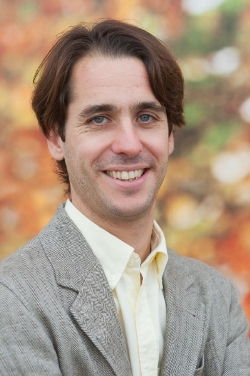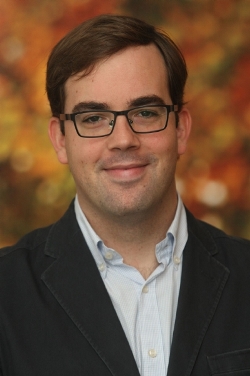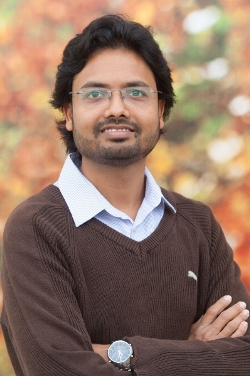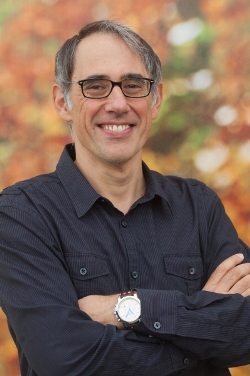New ICS researchers introduce themselves
Gonzalo Arrondo, Juan Pablo Domínguez, Joseph Flavian Gomes, Adrian Pablé and Constantin Parvulescu talk about their research field and their recent incorporation to the center.
The ICS team Institute for Culture and Society (ICS) team has four new researchers for this year - GonzaloArrondo, Juan Pablo Domínguez, Joseph Flavian Gomes and Constantin Parvulescu - and a new visitor researcher , Adrian Pablé. These new additions reflect the international character promoted by the ICS and bring together people from different countries and scientific cultures such as Switzerland, Romania, Spain or India.
In addition to them, Antonio Noguera (ATLANTES Program and Clínica Universidad de Navarra) and Maria Stozek (Education of affectivity and human sexuality) will soon join the team.

Arrondo participated as a researcher post-doc in the project 'Emotional culture and identity' of the ICS in 2013. After a stay at Cambridge University, he returns to high school to join the group 'Mind-brain' as researcher.
What is your general field of research?
My research focuses on the relationship between brain and behavior in complex decision making. In terms of technical tools, I am specialized in the design and analysis of functional magnetic resonance imaging (fMRI) experiments. fMRI is a technique that allows to extrapolate the brain areas that are involved in the performance of a task. I am also interested in the whole field of experimental psychology.
What activities of research will you develop during your stay in Pamplona?
At ICS I will collaborate in projects that study decision making and training of habits from an applied perspective. Likewise, I also want to evaluate the programs of study existing in the academic community in relation to the possible nootropic effect of substances such as amphetamines with the goal to inform the discussion ethical-social that exists about their use.
What encouraged you to join ICS?
I found the strong interdisciplinary character of the ICS particularly interesting. The training of the researchers is very different, and yet the work is clearly collaborative. This is very interesting for a person -as is my case- whose background is not framed in the traditional distinction of "Science or Letters". Finally, the synergy that can occur between ICS, the new psychology School and Education, and the university's science area also motivated me enormously.

Juan Pablo begins a second stay at project 'Religion and Civil Society'.
What is your research field in general?
My specialization program is the intellectual history of Europe from the Enlightenment to the 20th century. My two most frequent fields of study are the construction of national identities and the development of ideas of religious freedom.
What activities of research will you develop during your stay in Pamplona?
In this second stay at the ICS I plan to deepen my study on the statist character of the Enlightenment idea of tolerance and complete my project on the role of religious intolerance in the construction of the image of Spain at the time of the liberal revolutions.
What encouraged you to join ICS?
I have a PhD from the University of Navarra and I have known ICS since its origins. In addition, I have already worked here for more than three years. The possibility of developing my research in an interdisciplinary field is, without a doubt, what I like most about working at the ICS.

Gomes now joins the Navarra Center for International Development (NCID) as researcher .
What is your general field of research?
My main areas of interest have to do with economic development and economic policy, focusing in particular on issues such as ethnic divisions, civil conflict and gender inequality.
What activities of research will you develop during your stay in Pamplona?
During my stay in Navarra, I plan to focus my research on three different projects: 1- How the spatial distribution of diverse ethnicities affects socioeconomic outcomes, including the provision of public goods, civil conflict and economic development ; 2- The effects of gender bias on gender inequality and its consequences on health, such as high maternal mortality rates; 3- The effects of environmental conditions during early life on health in later life.
What encouraged you to join ICS?
ICS is a team of researchers doing a really interesting work within the Social Sciences. NCID is not the only program that focuses on economic development , one of my main fields of interest, but ICS itself is a center multidisciplinary, which makes it an interesting place to work.
Philology She completed her programs of study in English and Italian at the University of Zurich (Switzerland), where she also completed a Master's Degree in English linguistics. After a year of postgraduate program at the University of Ottawa (Canada), she worked at two universities in her home country, Switzerland: Bern and Lausanne.
Currently, Pablé is Senior Associate Professor of the School of English at the University of Hong Kong.
He joins project 'Public discourse. Persuasive and Interpretive Strategies' as a visiting researcher .
What is your research field in general?
My research focuses on general questions about language and communication, such as what theories of symbol are currently offered in linguistics, Philosophy and semiotics, what philosophies of language make scholars interested in language and communication adhere to, or what is the relationship between academic linguistics and non-expert linguistics.
I am an integrative linguist, a school that takes its inspiration from the semiology developed by Professor Roy Harris (1931-2015) of Oxford University.
What activities of research will you develop during your stay in Pamplona?
I would like to reflect on "communication"; on communication as a "thing" and communication as a word. I would also like to reflect on how this term is used, both in the academic speech and in the non-expert speech , also relating this issue to an integrative approach of communication.
What encouraged you to join ICS?
I chose ICS because of its interdisciplinary nature and the importance of several of its projects for my research on the Philosophy of language and communication.
Constantin Parvulescu (project 'Emotional culture and identity')

In addition, since last year, she is Visiting Professor at the department of programs of study Contextual at the University of St. Gallen in Switzerland.
Constantin Parvulescu joins researcher at project 'Emotional culture and identity'.
What is your research field in general?
I study film texts and their link to history and political-economic thought. For the past six years I have written mostly about Eastern European cinema. The book I have just published, Orphans of the East: Postwar Eastern European Cinema and the Revolutionary Subject, is my major contribution to this field.
What activities of research will you develop during your stay in Pamplona?
I have just started a new project which continues the work I did as co-publisher of the collection A Companion to the Historical Film. My current project investigates cinematic representations of Wall Street business. My purpose is to reveal how Wall Street is positioned in the popular imagination, to debate its myths, and to shed light on the emotional and spectacular dimension of financial services.
What encouraged you to join ICS?
My project fits very well with ICS research and its 'Emotional culture and identity' program. The high school offers me ideal conditions for writing and infrastructure to do reliable research. It also has a formidable Library Services . In addition, I feel that I am in a stimulating environment with people who share my same interests and passion for research.






